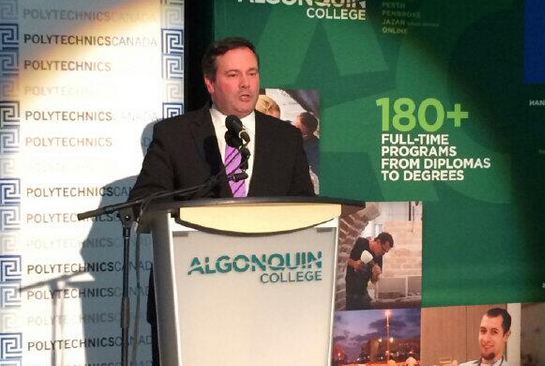Canada News
Tories ponder tougher measures concerning temporary foreign workers

Employment Ministery Jason Kenney at the PolyCan Conference. Photo courtesy of @kenneyjason on Twitter
OTTAWA — Ottawa is considering a further crackdown on its embattled temporary foreign worker program that could result in higher fees for companies hoping to hire foreign help and an elimination of the practice altogether in areas of high unemployment, The Canadian Press has learned.
The government presented various options on how to fix the troubled program during a closed-door meeting Thursday with stakeholders who included business representatives and labour union officials.
Among those options was the implementation of a so-called wage floor that would prevent companies from paying foreign workers beneath a set wage level still to be determined.
That measure would be aimed at making it more difficult for employers like low-wage fast-food restaurants to access the program, the stakeholders say.
But they also point out it could inflict further headaches on Employment Minister Jason Kenney if the set salary level is higher than the minimum wage, meaning temporary foreign workers would stand to make better money than Canadians.
Kenney’s goal, however, appeared to be to compel Canadian firms to hike their wages. The minister told employers as much last month, when he called upon fast-food restaurants to pay their employees a better wage and hire more Canadians.
Government officials also floated the possibility of significantly higher fees for companies seeking temporary foreign workers. Those fees would be on par with what American companies are charged to hire such employees, the stakeholders were told.
Canadian companies are currently charged $275 to apply to hire temporary foreign workers. In the U.S., employers can pay as much as $2,300 to access the American program.
Kenney has been on the hot seat for weeks as fresh allegations have surfaced about abuses of the temporary foreign worker program by various companies, but particularly those in the food services sector.
Last month, he placed a temporary ban on restaurants that prevents them from accessing the program, and has been vowing that a new slate of rule changes was on the horizon.
Those changes were floated to stakeholders Thursday.
No final decisions have been made on further restrictions, the stakeholders emphasized. The government simply laid out potential ideas to tackle the abuses, raising the possibility of exempting areas of the country with full employment from any crackdown measures.
Dan Kelly, head of the Canadian Federation of Independent Business, was among the stakeholders at Thursday’s meeting. He said he wasn’t impressed with the ideas presented by the government.
“Sadly, it appears the federal government may bow to the political heat over the TFW issue and gut the program for employers of lower-skilled and entry level workers,” he said.
Linking access to the program to unemployment rates “assumes that the unemployed are willing and ready to work in all sectors of the economy and available when a business needs them,” he added.
“We have to remember that there are many regions, sectors, types of work and shifts that struggle to find the people they need.”
The temporary foreign worker program has ballooned under the Conservatives from about 100,000 people in 2002 to as many as 338,000 now working across the country. In 2013 alone, Ottawa approved approximately 240,000 temporary foreign workers.
Data compiled by Kenney’s department shows that thousands of companies and government departments, federal and provincial alike, have hired foreign help in recent years.
From doggie spas to oil companies, employers have been given the green light to hire temporary foreign workers even in regions of the country struggling with joblessness, including the Maritimes and southwestern Ontario, and in sectors where there is no apparent lack of domestic candidates.
The controversy has been one of the most vexing to confront Kenney during his many years as one of Prime Minister Stephen Harper’s most valued cabinet lieutenants.
Known as Mr. Fix-It by some of his cabinet colleagues, Kenney has pledged to bring in major reforms to the system, including beefing up the auditing powers of federal inspectors who are hunting down abusers.





















